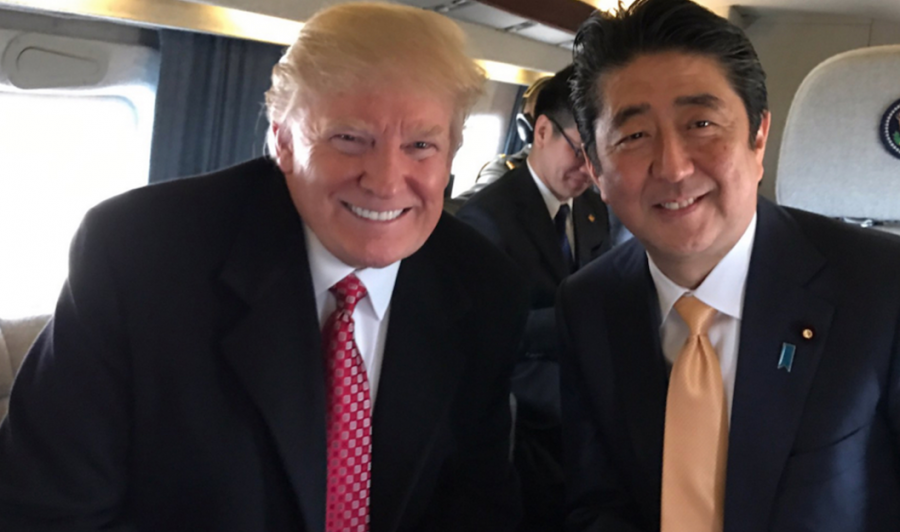Over the past week, President Donald Trump has begun his involvement in the Asia Pacific political theater, which included reneging on some of his strongest campaign rhetoric.
During the busy week, Trump and his constituents have been diplomatically involved with China, Japan, and to some extent, North and South Korea. By the end of the weekend, Trump notably backtracked on a large portion of the incendiary language and policy that headlined his presidential campaign .
Ron Suleski, Suffolk University history professor and Director of Rosenberg Institute for East Asian Studies, has spent decades studying the countries that Trump has recently begun to make connections with. Suleski spent nearly 20 years living in Tokyo, Japan before returning to America to work at Harvard’s Fairbank Center for Chinese Studies. Suleski was also elected to be the President of the Asiatic Society of Japan. His eight-year term was the longest in the society’s more than two century long history.
“I’m as mystified by [Trump] as anyone is,” said Suleski. “During the election campaign he was talking very irresponsibly about a lot of things and it seemed that a lot of people in the United States liked that. Now that he’s in office, so far, he’s had to change what he’s saying.”
On Thursday, President Trump spoke on the phone with Chinese President Xi Jinping. During the conversation, Trump backed down on previous threats of nonsupport for China by agreeing to honor the “One China” policy that asserts that there is only one Chinese government, according to multiple news sources.
During his campaign, Trump said that, without concessions from Beijing, he saw no reason that the agreement should continue.
Tension had been forming between the United States and Chinese president after Trump answered a phone call from Taiwan after being elected, breaking diplomatic protocol that has lasted for decades.
“President Xi Jinping had been angered by what Trump was saying in the election, so they hadn’t talked yet,” said Soleski. “During the call they arranged for President Xi to ask Trump if he supported the ‘One China’ policy. It was predetermined that Trump would say yes. Xi Jinping wouldn’t have made that call without assurance.”
The next day, President Trump held a Press Conference with Japan’s Prime Minister Shinzo Abe to discuss industry, the Trans-Pacific Partnership, immigration and the looming threat of North Korea’s ballistic missile tests.
The two world leaders engaged in a cordial discourage that starkly differed from the anti-Japan rhetoric used by Trump during his campaign.
Abe arrived in Washington and announced a substantial proposal to invest $150 billion in U.S. infrastructure that would include a high-speed bullet train, and create more than 700,000 American jobs.
This appeasement was welcomed by Trump, who treated Japan as a verbal punching bag during his campaign to rail against current U.S. political alliances.
“I didn’t know how [the talk] would go, but I didn’t think it would go that way at all,” said Suleski. “It went very well only because at any point Donald Trump backed up two steps and spoke the exact words that he was criticizing. Nobody knows what he’s going to do next. He may think that it’s to his advantage, but I don’t think it is.”
According to Suleski, Trump and Abe share similiar ideals. Both follow a conservative ideology and have instituted exceptionalist ideals into their political playbooks.
“In some ways they’re alike,” said Suleski. “They are both right-wing politicians and I don’t know if they touched on that. One says ‘Make America Great Again’ and the other says ‘Japan First’.”
While running for office, Trump made inflammatory claims that Japan “doesn’t pay us for defense” and “If we’re attacked, Japan doesn’t have to do anything. They can sit home and watch Sony television, OK?”, but this Friday he changed his tune and stated “it is important that the United States and Japan continue to invest very heavily in the alliance to build up our defense and our defensive capabilities.”
He also thanked Abe for hosting U.S. armed forces in Japan.
“Yes, Japan is our ally and the same goes for Korea and China; why [Trump] didn’t say that from the beginning, I don’t know,” said Suleski.
During the press conference President Trump stated that the Japanese/U.S. alliance was the “cornerstone” of peace in the Asia Pacific.
“We will work together to promote our shared interests including freedom from navigation and defending against the North Korean missile and nuclear threat,” Trump said at the press conference. “I consider both a very high priority”
Less than two days later, as Trump and Abe spent the weekend in Mar-a-Lago, North Korea launched a missile over the Sea of Japan, reported multiple news sources.
The missile fell short from reaching land, only traveling about 310 miles before plunging into the sea, but the launch was described by South Korean officials to The New York Times, as “The North’s first attempt at testing Trump’s policy on the isolated country”
According to Suleski, the North Korean missile launch was most likely a threat, but South Korea’s statements following the launch were just a continuation of the country’s propaganda machine.
“South Koreans are making political propaganda like they always do,” Suleski said. “So naturally they are going to say it’s a warning. It’s not an objective analysis. It’s propaganda”
Despite the baseless assertion by South Korean officials, Suleski still interpreted the missile test as a threat to multiple countries, not just the missiles target.
“It’s a threat to all of the neighbors of North Korea: South Korea, Japan, China and in a sense Russia,” Suleski said. “Every Time something big happens North Korea wants to assert that ‘hey we’re here’ and play the role of the tough guy. They always do that.”
The news of the launch was followed by a gaffe-ridden crisis management job by Trump.
Photo’s from Massachusetts resident and Mar-a-Lago member Richard DeAgazio’s Facebook page depicted Trump, Abe, and their various political aides pouring over documents while huddled around a dinner table at the Florida golf resort.
DeAgazio’s photos, and the captions he included, detail the scene. Bystanders used their cellphone flashlights to illuminate the documents that President Trump was reviewing.
Another photo from DeAgazio featured the man who allegedly carried the “nuclear football”, a device that allows Trump to have immediate access to America’s nuclear arsenal. The photos have been removed after a public outcry that called into question whether this type of information should be readily available to private citizen members of Mar-a-Lago.
Addressing the criticism, U.S. Press Secretary Sean Spicer said in a statement that no classified material was discussed at Mar-a-Lago during the weekend.
Abe, upon learning the news of the launch, called North Korea’s actions intolerable in a statement to the multiple new sources at Mar-a Lago; while Trump did not directly speak on the missile, itself, but did state that the U.S. will staunchly back Japan.
Abe also called for North Korea to abandon all nuclear and ballistic missile programs, although the lofty provocation has not yet been followed by any reactionary efforts to confront North Korea’s latest international transgression.
North Korean Leader Kim Jong-Un has yet to officially confirm if the missile launch was intended to be a political message, although during a recent New Year’s speech Un announced that North Korea was in the “final stages” of preparing to conduct its first test of an intercontinental ballistic missile.
“The beauty of American policy with Asia was that it has managed to keep the peace and avoid military conflict for decades,” said Suleski. “Partly, it’s because none of the countries really want it. Maybe North Korea really wants it because they have the least to lose.”








